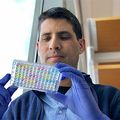Bacterial Response and Adaptation to Host-Targeting Chemotherapies Alters Drug Metabolism
Many clinically approved drugs that are prescribed to modulate human physiology are also potent antimicrobials at physiological concentrations. Recent systematic studies indicate that bacterial toxicity is frequent in anti-neoplastic drugs used for treating cancer. Using pooled genetic screens, we systematically mapped all loss-of-function mutations modulating sensitivity against three chemotherapy drugs in Escherichia coli. We further characterized the mechanisms that can confer resistance by evolving bacteria in serial transfer evolution experiments and identifying adaptive mutations by whole-genome-sequencing. Our experiments revealed that changes in multiple and diverse pathways can confer resistance, indicating that resistance can readily emerge over short evolutionary time scales. Interestingly, given that many of pathways underlying resistance can potentially influence drug transport and metabolism, we predicted that bacterial resistance will frequently impact drug availability for host cells neighboring resistant bacteria. Lastly, we examined the impact of bacterial evolved resistance on the host by measuring chemotherapy toxicity in Caenorhabditis elegans while controlling for its bacterial diet. We discovered that nutrient availability during bacterial evolution dictated the dietary effect on the host – only bacteria evolving in nutrient-poor media reduced host drug toxicity. Our work suggests that bacteria can rapidly adapt to tumor-targeting chemotherapies and by doing so may also impact host treatment success.
Learning Objectives:
1. Explain how bacterial drug metabolism by the microbiome can impact treatment of the host.
2. Describe how a genetic loss-of-function screen provide insight on potential resistance mechanism during evolutionary adaption.
3. Clarify why information on the bacterial species identity in the host-microbiome can be insufficient for determining its influence on drug-tumor interaction.






